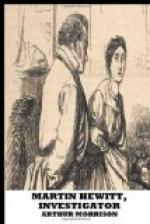Mirsky was caught, and, after two remands at the police-court, was extradited on the charge of forging Russian notes. It came out that he had written to the embassy, as Hewitt had surmised, stating that he had certain valuable information to offer, and the letter which Hewitt had seen delivered was an acknowledgment, and a request for more definite particulars. This was what gave rise to the impression that Mirsky had himself informed the Russian authorities of his forgeries. His real intent was very different, but was never guessed.
* * * * *
“I wonder,” Hewitt has once or twice observed, “whether, after all, it would not have paid the Russian authorities better on the whole if I had never investigated Mirsky’s little note factory. The Dixon torpedo was worth a good many twenty-ruble notes.”
V.
THE QUINTON JEWEL AFFAIR.
It was comparatively rarely that Hewitt came into contact with members of the regular criminal class—those, I mean, who are thieves, of one sort or another, by exclusive profession. Still, nobody could have been better prepared than Hewitt for encountering this class when it became necessary. By some means, which I never quite understood, he managed to keep abreast of the very latest fashions in the ever-changing slang dialect of the fraternity, and he was a perfect master of the more modern and debased form of Romany. So much so that frequently a gypsy who began (as they always do) by pretending that he understood nothing, and never heard of a gypsy language, ended by confessing that Hewitt could rokker better than most Romany chals themselves.
By this acquaintance with their habits and talk Hewitt was sometimes able to render efficient service in cases of especial importance. In the Quinton jewel affair Hewitt came into contact with a very accomplished thief.
The case will probably be very well remembered. Sir Valentine Quinton, before he married, had been as poor as only a man of rank with an old country establishment to keep up can be. His marriage, however, with the daughter of a wealthy financier had changed all that, and now the Quinton establishment was carried on on as lavish a scale as might be; and, indeed, the extravagant habits of Lady Quinton herself rendered it an extremely lucky thing that she had brought a fortune with her.
Among other things her jewels made quite a collection, and chief among them was the great ruby, one of the very few that were sent to this country to be sold (at an average price of somewhere about twenty thousand pounds apiece, I believe) by the Burmese king before the annexation of his country. Let but a ruby be of a great size and color, and no equally fine diamond can approach its value. Well, this great ruby (which was set in a pendant, by the by), together with a necklace, brooches, bracelets, ear-rings—indeed,




